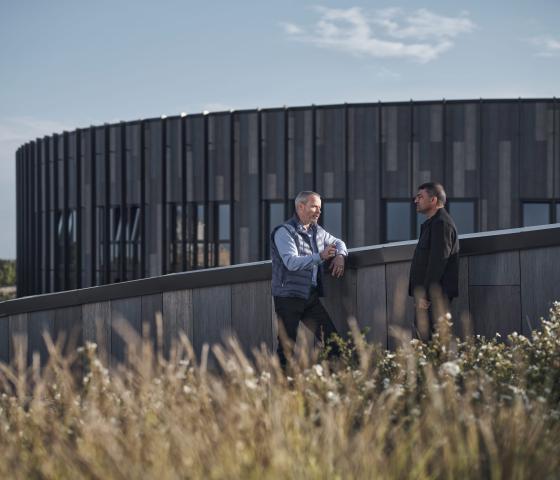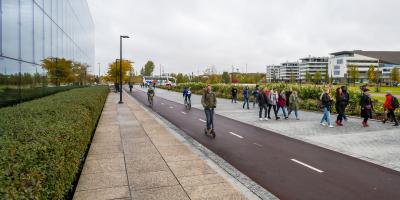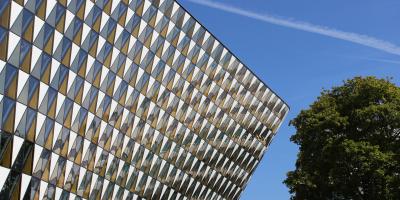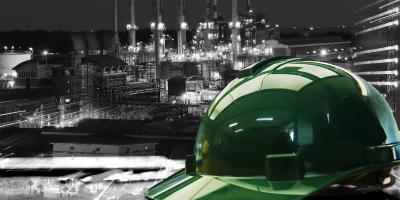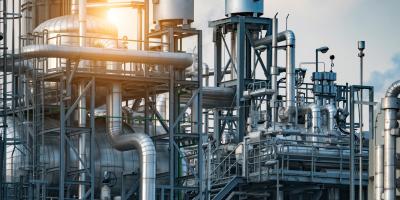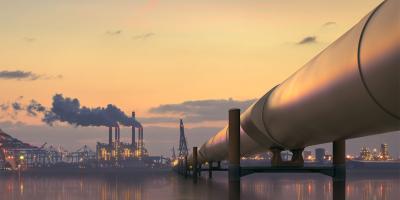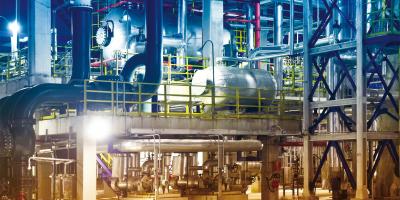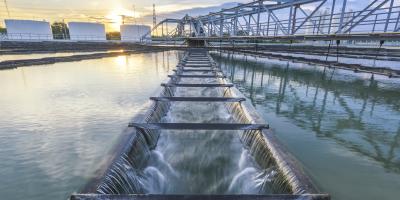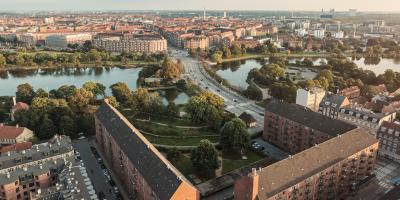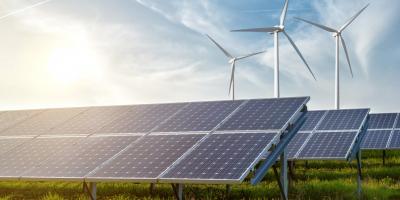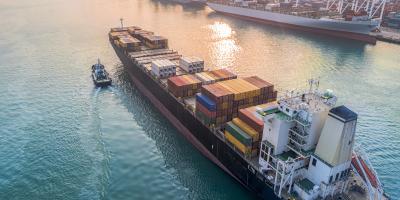
Sustainability Engineering and Consulting Services
Sustainability Services, engineered by AFRY
We engineer change in everything we do with a higher purpose in mind, to accelerate the transition to a sustainable society, we do this together with our clients. We engineer sustainability services along the entire value chain of industry, energy, and infrastructure companies as well as the public sector.
We see four main drivers; decarbonisation, circularity, electrification and digitalisation, that drives the sustainability transition across our business sectors. At AFRY, we are well positioned to take a leading role in the ongoing transition, with strong emphasis on value creation for our clients.
AFRY’s holds this unique position and leading partner in the sustainability transition through our solutions, our global presence and our ambitions. Global challenges such as the climate crisis, biodiversity loss, the rise of extreme poverty, and pollution in air, water and land increases the demand for sustainable solutions, while digitalisation is set to remain an important driver in all industries and sectors.
Responding to global challenges
Climate change mitigation and adaption are one of the key challenges our modern societies must tackle in the upcoming decades. This involves measures to mitigate climate change by decarbonising our energy, industry and infrastructure sectors through sustainable practices and renewable energy sources. It also involves the adaptation of communities to unavoidable climate change effects by evaluating climate risks and developing risk management plans.
AFRY offers market-leading services for many sectors that will play a crucial role in mitigating and adapting to climate change. The energy transition and renewable energy, electric vehicles and the battery sector, as well as the bio transition in industries including for example sustainable packaging, biofuels and other biorefining solutions are all playing a key role in the sustainability transition. Bio-based textile fibres (MMCF) pave the way for improved sustainability in the textile industry.
Hydrogen and Power-to-X solutions as well as Carbon Capture Utilisation and Storages (CCUS), will be in focus to decarbonise many operations - from industrial production processes to e-fuels and much more. Sustainable mining & metals will be a key enabler for sustainable technologies as more minerals are required for renewable energy solutions, e-vehicle batteries and mobile solutions. Green steel will be an important step towards more sustainable technologies, buildings and materials.
Protecting water and marine resources is critical for the long-term sustainability of our planet. Companies play an important role in this effort through their operations, products, and supply chains.
Companies can protect water and marine resources by reducing their water usage and implementing water conservation measures. This can include using more efficient irrigation systems, reusing water in production processes, and reducing water pollution by treating and properly disposing of waste water.
The protection of water resources is crucial for all sectors of energy, industry and infrastructure. AFRY offers a wide range of support to all private and public clients in their water management, including sludge and waste treatment, wastewater treatment, water treatment and supply, as well as stormwater management and flood protection. For example, Water management in industrial plants secures water availability and efficiency, that are crucial elements for all industrial operations.
In the transition towards a circular economy, we think that bio-based industry, efficient resource use and circular solutions together are the game changer. By increasing the value of bio-based materials, using of new raw-materials, reducing waste and embracing circular solutions, we will reach higher resource efficiency.
Circularity will require improved resource and operational efficiencies to help tackle climate change, biodiversity loss, resource scarcity and pollution. AFRY is active in several recycling solutions, including paper & board, textiles, plastics and metals & minerals.
We provide dedicated offerings for overall resource efficiency solutions including waste, water and raw-material, and utilisation of by- and waste streams. We know technologies for both mechanical and chemical recycling for textiles and plastics.
Pollution prevention and control is essential for protecting the environment, human health and communities, achieving cost savings, and maintaining compliance with regulations. It's an essential aspect of sustainable development and a key consideration for all industries.
In the energy sector, pollution control can include using renewable energy sources, implementing carbon capture utilisation and storage (CCUS) technologies, and increasing energy efficiency.
In the industry sector, it can include using efficient and state-of-the-art production technologies, recycling and reusing materials, and minimising waste.
In the infrastructure sector, it can include designing and building infrastructure with sustainability in mind, such as using sustainable building materials and incorporating green spaces, and ensuring adequate monitoring, reporting and compliance with regulations. Transportation and low-emission automotive mobility will be important element in pollution prevention.
The protection of the world's ecosystems and biodiversity is closely linked to the decisions made across energy, industry, and infrastructure operations. These sectors have a significant impact on the environment and related potential to make a positive difference.
The use of renewable energy sources, such as solar and wind power, can help reduce negative impacts as can implementing sustainable practices, such as using recycled materials and minimising waste. When designing new infrastructure, it is important to consider the impact on ecosystems and biodiversity, and to take measures to minimise or mitigate these impacts.
By taking a sustainable and integrated approach, we can help to minimise the negative impact of these projects on the environment and promote the conservation and restoration of ecosystems and biodiversity.
Future living is about creating urban areas that are livable, sustainable, and resilient, and that promote the well-being of all inhabitants while minimising the environmental footprint of human activities. It requires collaboration between different sectors and stakeholders, including government, business, and communities, to create a sustainable future.
AFRY's expertise spans across a wide spectrum of future living topics, from well-connected, green future cities with sustainable, efficient, and accessible transportation systems, to sustainable buildings that are resource-efficient and use advanced building materials and technologies starting from architectural design. At AFRY, we use our cross-sectoral expertise to create urban planning solutions for the societies of the future.
Future food also represents one of AFRY's expertise areas, envisioning a food system that is sustainable, healthy, and resilient, with a focus on reducing food waste, promoting local and organic food production, and reducing the environmental footprint of food production and transportation. It also includes the integration of vertical and indoor farming, as well as other innovative technologies that can make food production more efficient, sustainable and resilient.
AFRY Sustainability Services
At AFRY, we actively seek out transformative, innovative assignments in our selected markets that bring society closer to a sustainable future. By combining design and engineering competence with our deep sector knowledge, digitalisation capabilities and sustainability expertise, we develop scalable solutions that accelerate the transition towards a sustainable society.
Environmental regulations and higher demands can be a challenge as well as an opportunity for all sectors and industries. AFRY offers a full spectrum of sustainability services to help you to meet these requirements.
Our Sustainability Engineering and Consulting service offering covers all areas of sustainability (Social, Environmental and Economic & Governance) and supports clients in all stages of the lifecycle of their operations - from strategies to operations, and from product sustainability to supply chain.
Sustainability governance & strategies
Sustainability governance and strategies cover all aspects of sustainability - environmental, social and economic. All our governance and strategic services can be applied from the corporate level to smaller unit-based operations. Our consultants help with new business models and ecosystems for climate change mitigation and adaption, resource efficiency, circularity, biodiversity and much more.
AFRY's extensive range of services offers comprehensive coverage of sustainability strategies including KPIs and roadmaps; business potential evaluation and market strategies; reporting & benchmarking; authority requirements (permitting, licenses) and alignment with regulations; environmental management; social responsibility & safety management; environmental and social impact assessments (EIA, SIA); alignment with EU Taxonomy and ESG related services and greenhouse gas reduction roadmaps.

Explore our offerings in sustainability strategies and governance
People & Social responsibility
AFRY helps businesses to embed social responsibility into their sustainability practices. With interconnected challenges like increasing inequality, climate change, nature loss and water scarcity, pollution and emissions, it is time for businesses to identify and act upon their social impacts.
With a special focus on Health and Safety, AFRY offerings cover process safety; machinery safety; chemical safety & permitting; functional safety; explosive areas (ATEX). We support industry, energy and infrastructure sectors with risk analysis; authority & permitting; construction site safety; fire safety, and risk management. Social responsibility, social impact assessments, training and skill development are also important parts of our service offering.

Explore our offerings in social sustainability
Assets & Operations
Assets and operations sustainability includes the management of a company's physical resources and operations in a way that minimises negative environmental impacts and maximises positive social and economic outcomes. This can include things like energy and water conservation, the use of renewable energy sources, recycling and waste reduction, and environmentally-friendly building practices. It can also include measures to promote social and economic sustainability, such as fair labor practices, community engagement, and supply chain management.
AFRY's portfolio of services includes various decarbonisation services such as clean energy & electrification solutions and energy efficiency; emissions reduction solutions, GHG strategies, roadmaps and impact assessments; resource efficiency and circularity such as water; energy; raw materials; waste; side stream utilisation; circular equipment and buildings; sustainable production process such as operational efficiency; sustainable manufacturing lines; sustainable buildings & infrastructure.

Explore our offerings in sustainable assets & operations
Product sustainability
Product sustainability involves assessing the environmental impact of a product's materials, manufacturing processes, packaging, transportation, and end of life disposal. It also includes evaluating the social impact of the product, such as the working conditions of those who produce it and the product's impact on local communities.
For today's consumers, it's becoming increasingly important to design products that are durable, repairable, and recyclable, as well as using environmentally friendly materials and manufacturing processes. Companies can also focus on designing products that have a positive impact on society and the environment, such as energy-efficient appliances, eco-friendly cleaning products, or products made from recycled materials.
AFRY help customers to ensure that products are developed with sustainable environmental, social and economic benefits in mind, whilst also protecting public health and the environment over their whole life cycle, from the extraction of raw materials right through to final disposal. Our services cover the entire product lifecycle including product development, design, manufacturing, packaging, safety and circularity.

Explore our offerings in product sustainability
Sustainable Supply Chain
A sustainable supply chain is one that fully integrates ethical and environmentally responsible practices into a competitive and successful model. This can include a number of different practices and strategies, such as reducing greenhouse gas emissions and other environmental impacts associated with transportation and logistics, using renewable energy sources and implementing energy efficiency measures in manufacturing and distribution facilities, ensuring safe working conditions throughout the supply chain, implementing sustainable sourcing and procurement practices, incorporating recycling and waste reduction practices throughout the supply chain and continuously monitoring and improving the environmental and social performance of the supply chain.
A sustainable supply chain can bring benefits to the company such as cost savings, risk management, improved reputation, and increased innovation.
AFRY supports customers in sustainable sourcing. procurement and suppliers' sustainability qualification, logistics and sustainable transportation solutions.
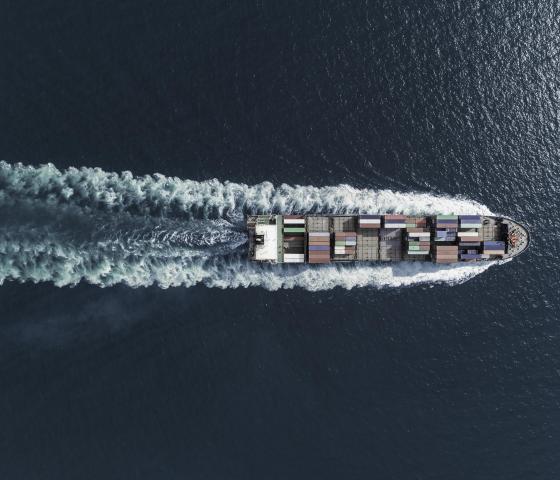
Explore our offerings for sustainable supply chains
Sustainability in investment projects
Sustainability in investment projects refers to considering the environmental, social, and governance (ESG) factors of a project, in addition to its financial performance. This approach aims to identify potential risks and opportunities associated with a project, and to ensure that it is aligned with the United Nations Sustainable Development Goals (SDGs) and other sustainability principles.
When assessing the sustainability of an investment project, investors may consider a wide range of factors, such as:
- Environmental impact: This includes assessing the project's impact on air and water quality, biodiversity, and greenhouse gas emissions, as well as its overall carbon footprint.
- Social impact: This includes evaluating the project's impact on local communities, including issues related to land rights, labor rights, and human rights.
- Governance: This includes assessing the project's alignment with good governance principles and compliance with relevant laws and regulations.
Sustainability in investment projects also includes looking for projects that have a positive impact on society and the environment, such as renewable energy projects, sustainable agriculture and forestry, and water treatment and conservation projects.
